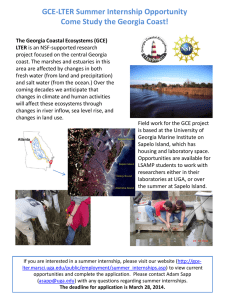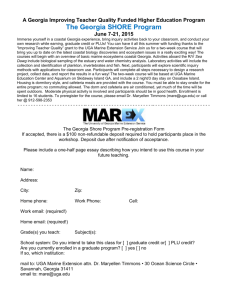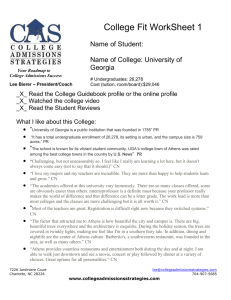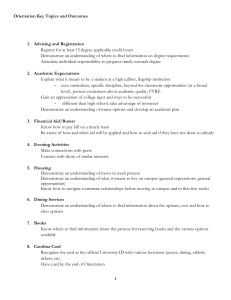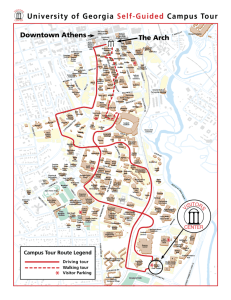University of Georgia North CampusWalking Tour Map
advertisement
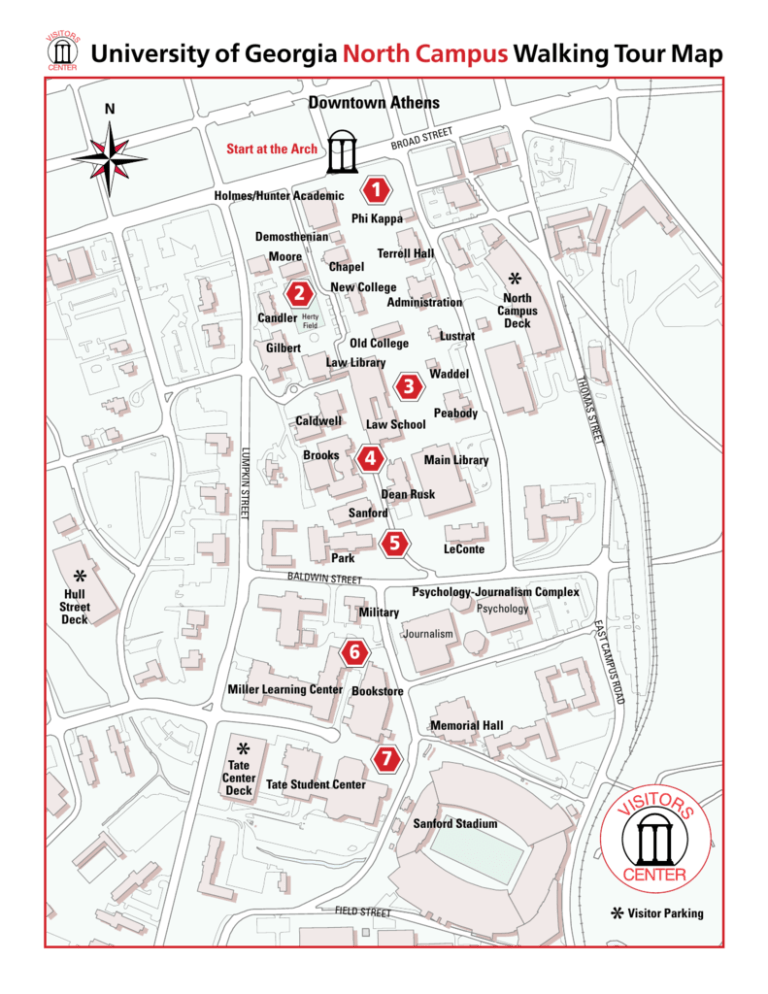
University of Georgia North Campus Walking Tour Map Downtown Athens N EET D STR BROA Start at the Arch 1 Holmes/Hunter Academic Phi Kappa Demosthenian Moore 2 Candler Gilbert Terrell Hall Chapel Herty Field Law Library Waddel T Main Library Dean Rusk Sanford 5 Park LeConte BALDWIN STREET Psychology-Journalism Complex Psychology Military Journalism PUS CAM 6 EAST Street Deck TREE LUMPKIN STREET 4 Brooks Peabody AS S Law School THOM Caldwell North Campus Deck Lustrat Old College 3 * Hull * New College Administration ROAD Miller Learning Center Bookstore Memorial Hall * Tate Center Deck Tate Student Center 7 Sanford Stadium FIELD STREET * Visitor Parking The Arch Erected in 1858, the Arch is modeled after the great seal of Georgia. The pillars stand for “Wisdom, Justice, and Moderation,” which is also the Georgia state motto. The University of Georgia was chartered in 1785 and was the first state-chartered institution of higher education in America. However, classes did not begin on campus until 1801. A well-known university legend states that any undergraduate that walks under the Arch will not graduate. Holmes-Hunter Academic Building STOP Originally, this building was two separate buildings: the Ivy building, which contained classrooms, and the Library. At the turn of the century, the buildings were joined. Today, the building houses offices for Student Affairs, Student Financial Aid, the Registrar, Institutional Diversity, and others. In January 2001, the building was renamed the Holmes-Hunter Academic Building in honor of Hamilton Holmes and Charlayne Hunter-Gault, the first African-American students to enroll at the University of Georgia. 1 Demosthenian Hall / Phi Kappa Hall The homes of two of UGA’s literary and debate societies, these buildings remain very much the same as they did during the antebellum period. During the Civil War, Union troops occupied Phi Kappa Hall. Chapel Dedicated in 1832, the Chapel served as the site where students and faculty attended church services three times each week. Today, assemblies, concerts and lectures are held here. A large framed oil painting of “The Interior of Saint Peter’s in Rome” is housed inside. A bell tower originally crowned the roof, but the bell was later placed at the top of a wooden tower at the back of the Chapel. Now the bell is rung only to mark athletic victories or other special occasions. Terrell Hall The Office of Undergraduate Admissions is located on the second and third floors of Terrell Hall. Information sessions for prospective first-year students are conducted Monday through Friday at 10:30 a.m. and 2:00 p.m. Information sessions for prospective transfer students are held every Friday at 1:00 p.m. The Department of Speech Communication, which offers undergraduate and graduate level degrees, is located on the first floor. New College STOP First built in 1822 and rebuilt in 1830 after being destroyed by fire, New College is in the midst of a full interior renovation. Over the years, the building has been home to various university departments and offices including the bookstore, pharmacy school, and most recently the Franklin College of Arts and Sciences. Upon completion of the current renovation in 2010, offices under the Vice President for Instruction and the Provost will move into New College. 2 Administration Building The Administration Building currently houses the offices of the university president and senior vice presidents. Originally, the building was constructed as a library for students but quickly became too small to house all library materials. In 1948, the Georgia Museum of Art opened in the basement. In 1982, the General Assembly designated the Georgia Museum of Art as the state’s official art museum. The museum was eventually moved to its current location on East Campus. Old College The oldest building on campus, built in 1806, Old College is modeled after Connecticut Hall at Yale (Abraham Baldwin, UGA’s first President, graduated from Yale). Crawford W. Long, a pioneer in the use of anesthesia, and Alexander Stephens, VP of the Confederacy, lived here when they were students at UGA. A commemorative plaque is located on the building’s north wall. The Franklin College dean’s office is housed here. Moore College/Herty Field Moore College houses the Honors Program and includes advising offices, computer labs and classrooms for Honors students. About 10 percent of each incoming freshman class is admitted to the Honors program. Honors students enjoy special opportunities for research, study abroad programs, and scholarships. Herty Field was UGA’s first athletic field and was the site of UGA’s first intercollegiate football game in 1892 when UGA defeated Mercer 50-0. The field is in the university’s wireless internet cloud and is a popular place for students to study and relax. Candler Hall This building is home to the School of Public and International Affairs (SPIA), where students can earn bachelors degrees in political science and international affairs. SPIA was created in 2001 from the department of political science. Now a distinct unit within UGA, the school also offers a nationally acclaimed masters degree in public administration. Gilbert Hall Gilbert Hall was the previous location of the university’s health center. The building currently houses the Department of Romance Languages. The department, one of the largest and most productive at the university, offers undergraduate and graduate programs in French, Italian, Portuguese, and Spanish. Law Library/Law School The UGA School of Law is located in Hirsch Hall with the Law Library adjacent to the school. Currently, Georgia Law ranks among the top public law schools in the country according to annual rankings by U.S. News & World Report. STOP 3 Lustrat House Built in 1847, the Lustrat House was originally located on the site of the Administration Building and was moved to its present location in 1903. Named for professor Joseph Lustrat, the building has served as a faculty house, an office for the university’s president, and a house museum. Today, it houses the Office of Legal Affairs. Waddel Hall Built in 1921, Waddell Hall was once known as Philosophical Hall. The second oldest building on campus, it has served as a chapel, gymnasium, and meeting facility. It currently houses the Office of Special Events. Peabody Hall Home to the Departments of Religion and Philosophy, Peabody Hall is named for George Peabody, a New England merchant who directed in his will that his estate be distributed to promote public education in the South. The religion department offers a diverse curriculum for both undergraduate and graduate students. The philosophy department also provides undergraduate and graduate level degrees. Ilah Dunlap Little Library (Main Library) Nearly 4 million volumes are contained in the four primary on-campus libraries. An elaborate computer system, GALILEO, helps students locate materials in libraries throughout the state’s university system. The Main Library’s Hargrett Rare Book and Manuscript Library contains a copy of the original Confederate Constitution and papers of Margaret Mitchell, author of Gone With the Wind, along with other rare and interesting materials. Dean Rusk Hall STOP Named for the U.S. Secretary of State in the Kennedy and Johnson administrations who served on the UGA law faculty for 20 years, Rusk Hall includes multi-purpose classrooms, an electronic courtroom, space for the Institute of Continuing Judicial Education, faculty offices for the Law School, and the Dean Rusk Center for International and Comparative Law. 4 Caldwell Hall (behind Law Library) Caldwell Hall houses classrooms and offices for the Terry College of Business and the College of Environment and Design, which was formed in 2001 as the first new college at UGA since 1969. The College of Environment and Design houses the largest landscape architecture program in the nation and offers undergraduate and graduate level degrees. Brooks Hall Brooks Hall is the home to the Terry College of Business, which consistently ranks among the top business schools in the country. The college offers undergraduate and graduate level degrees in multiple disciplines. The University of Georgia was the first southern university — and one of the first in the nation — to establish a school of business. Sanford Hall Funded through private gifts and dedicated in 1997 as a primary classroom facility for Terry College students, Sanford Hall has a student lounge, academic advising center and 13 seminar rooms and classrooms with seating capacity ranging from 10 to 330. The building accommodates wireless computer access, and every desktop in Sanford Hall — 900 seats in all — is equipped with a network connection for laptops. Park Hall STOP The Departments of English and Classics are housed in Park Hall. The undergraduate English program offers courses ranging from Old English and Contemporary American Literature to linguistics, film, and creative writing. The graduate program offers two masters degrees and a Ph.D. degree. 5 LeConte Hall The Department of History is located in LeConte Hall and offers bachelors, masters, and Ph.D. degrees. The department has a strong tradition of expertise in subjects ranging from early American to modern African American history and popular culture to foreign policy. Military Science Building The Military Science Building houses the university’s Army ROTC program. The program’s curriculum is an elective curriculum and is designed to train and develop future leaders. Courses cover management, ethics, tactics, law, military history, and Army society. Psychology-Journalism Complex The Psychology-Journalism (PJ) complex houses the Grady College of Journalism and Mass Communication, the Department of Psychology, auditoriums, and general classroom space. The College of Journalism and Mass Communication is home to one of the top journalism programs in the nation and offers undergraduate and graduate level degrees. It is also home to the Peabody Awards, the world’s oldest and most prestigious honor in electronic media. In addition to providing opportunities for undergraduate and graduate degrees, the psychology department also contains a fully staffed psychology clinic with services available to students and the public. The department’s graduate program is nationally recognized and APA accredited, and students graduating from the program have gone on to successful careers in a variety of academic, research, and applied settings. Zell B. Miller Learning Center STOP The $42 million Miller Learning Center, opened in 2003, houses classrooms and library space in the heart of campus and is the most popular location on campus for studying individually or in groups. The building is entirely dedicated to students and houses no departmental or faculty offices. Inside are nearly 100 individual study rooms and more than 500 flat-panel computer workstations plus a Mac design lab. There is a coffee shop located on the second floor. 6 University Bookstore STOP The bookstore is normally open Monday-Thursday from 8:00 a.m. – 7:00 p.m., on Friday from 8:00 a.m. – 5:00 p.m., on Saturday from 10:00 a.m. – 5:00 p.m. and on Sunday from 11:00 a.m. – 5:00 p.m. The bookstore sells books, computers, souvenirs, UGA apparel, supplies, etc. 7 Tate Student Center Named for the late William Tate, long-time Dean of Men, the center contains a food court, a 500-seat movie theater, dance studios, a US Post Office, an information desk, offices for a number of student organizations, and meeting rooms. A $58 million expansion and renovation to the Tate Center opened in June 2009. The expansion features a new location for Print and Copy Services as well as retail space, a gaming area, a food court, a small performance amphitheatre, and a nearly 12,000-square foot stateof-the-art multi-purpose space. Memorial Hall Built in 1929 to honor the 47 UGA men who died in WWI, Memorial Hall contains offices for the African American Cultural Center, Multicultural Services, and International Student Life. In May 2009, the Franklin College of Arts and Sciences moved its advising and graduation certification offices to Memorial Hall from New College. Sanford Stadium Home of the Georgia Bulldogs, the stadium seats 92,746 and is the sixth largest on-campus stadium in the country. It was the site of the medal rounds for 1996 Olympic Soccer Games. The famous hedges were removed in 1995 to enlarge the playing field for soccer, and were replaced by descendants of the original hedges. University of Georgia West Campus Highlights Map *Hull N Street Deck Russell Lipscomb AV E T RS HU ER OV CL EY ST FINL CHURCH West Campus Deck Legion Pool LUMP Creswell Brumby TR EET Bolton Dining Commons KIN S B Mell T TREE RS AXTE Hull Church Boggs ST Oglethorpe House * Visitor Parking Oglethorpe Dining Commons Hill Community Residence Halls Oglethorpe House (”O House“) is co-ed with suite-style living arrangements with a bath between two rooms. Oglethorpe Dining Commons is next to the residence hall and is one of four dining commons on campus. The Hill Community also consists of several smaller residence halls, all of which have sinks in the rooms. Housing approximately 160 residents each, Hill, Boggs, Lipscomb, and Mell are co-ed while Church is entirely female. Colonial Community Residence Halls Brumby Hall is all-female with community baths. Russell Hall is co-ed by wing and Creswell Hall is co-ed by floor, both with community baths. All three high-rise residence halls house approximately 900 first-year students. In 2005, the University made it mandatory for first-year students to live on campus. Bolton Dining Commons Bolton is the largest of the four dining commons in terms of square footage. Students can choose to purchase a meal plan contract to be a part of a 5 day or 7 day meal plan, which will grant them unlimited access to any dining commons on campus. University Food Services is consistently ranked among the top food service programs in the nation. University of Georgia South Campus Highlights Map Geography Geology Chemistry Physics N Biological Sciences DW CEDAR ST EITS/Statistics Natural History Physical Plant Grounds Davison Life Sciences ORD D RIVE SANF ST Coliseum Training Facility Carlton Coverdell Street Center Deck Dan Magill Tennis Lindsey Hopkins Complex Indoor Tennis Stadium * D N O LT Foley Field Stegeman Coliseum Environmental Health Sciences S ROA South Food Sciences AMPU Georgia Center for Continuing Education Rankin M. Smith Student Athlete Academic Center Barrow Science Boyd Grad Library Studies Marine Sciences Dance Hardman Snelling Dining Ecology Commons Wilson Pharmacy Forestry & Natural Pharmacy Resources South Campus Deck Coop Ext Service (Hoke Smith) Butts-Mehre Vince Building Dooley Athletic Complex * Visitor Parking Soule R CA ns Towk c e Sp Trac RE T NS KI MP LU ET Speirs DRIVE * Mary Lyndon Poultry Sciences S OK Myers Rutherford Conner C EAST O BR Dawson Miller Plant Sciences Tucker US Forest Service Aderhold Veterinary Medicine Animal Health Research center Academics South Campus is home to a variety of departments, mostly scientific and mathematical in nature. Two exceptions are the College of Education (Aderhold Hall) and the School of Social Work (Tucker Hall). Known as Science Row, Cedar Street is home to a number of science departments, including Biology, Chemistry, and Geography, as well as the College of Agriculture and Environmental Sciences (Conner Hall). The Paul D. Coverdell Center for Biomedical and Health Sciences opened in 2006. Two of UGA’s professional schools, the College of Pharmacy and the College of Veterinary Medicine, are located on South Campus. Athletics The Vince Dooley Athletic Complex encompasses several athletic facilities, including Stegeman Coliseum, the Coliseum Training Facility, Foley Field, the Spec Towns Track, the Dan Magill Tennis Complex, and the Butts-Mehre Heritage Hall, home of the Athletic Department and a sports museum. Lodging The Georgia Center for Continuing Education Hotel offers 200 rooms and suites at competitive rates. The hotel offers the Parent Club, an exclusive benefit for all UGA parents and guardians that includes a free night’s lodging for every four paid hotel nights and discounts on meals at hotel restaurants. Student Life Myers Residential Community includes Myers Hall (Honors Magnet), Mary Lyndon Hall (language immersion program), Rutherford Hall (Franklin Residential College), and Soule Hall (all female). Snelling Dining Commons offers continuous 24-hour service from 7:00 a.m. Monday through 2:30 p.m. Friday during fall and spring semesters. University of Georgia East Campus Highlights Map Printing N Performing Arts Center Georgia Museum of Art Hugh Hodgson School of Music Lamar Dodd School of Art EAST CAM PUS ROA D Joe Frank Harris Commons * Ramsey Center East Campus Deck McWhorter East Hall Village Deck Vandiver Hall Rooker Hall CAES Activity Center University Health Center Family and Graduate Housing University Village COL L E GE Intramural Fields Visitors Center STA TION ROA D Rhodes Animal Science Center * Visitor Parking Academics Adjacent to the Hugh Hodgson School of Music, the $40 million Lamar Dodd School of Art building opened in 2008. The Edgar L. Rhodes Animal Science Center is home to the Animal and Dairy Science Department and world-famous scientist and animal cloning expert Steve Stice. Arts The Performing and Visual Arts Complex features the state of Georgia’s official art museum, the Georgia Museum of Art, and the Performing Arts Center, with features two superb concert halls. Student Life The East Campus Village, a community of apartment-style residence halls, and Joe Frank Harris Commons give East Campus its only housing and dining facilities. The Ramsey Student Center for Physical Activities is the university’s 5.5 acre workout facility and features strength and conditioning rooms; courts for basketball, volleyball, squash, and racquetball; swimming pools; an indoor track; a climbing wall; and studios for aerobics, spinning, and boxing classes. The intramural fields offer several walking trails, tennis courts, soccer and softball/baseball fields, and a batting cage. University Health Center This facility serves currently enrolled students. Services include an at-cost pharmacy, acute care clinic, travel clinic, allergy clinic, women’s clinic, dental clinic, sports medicine clinic, and counseling and psychological sevices. A $17 million expansion opened in April 2009.
